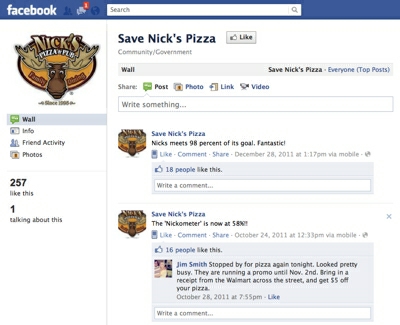Did an Email to Customers Save a Pizza Business?
When Nick's Pizza & Pub was losing business, CEO Nick Sarillo did something against conventional wisdom: he sent an email to customers describing the situation and asking them to return. Sarillo engaged his customers in saving the two restaurants, which is just the result he got.
In his email, Sarillo makes several emotional appeals, such as this one:
"I realize that sending an e-mail like this is risky and unorthodox, but I don't care because I don't have anything to fear or hide. We run our business with totally open books, and the core team that shows up to our weekly fiscal huddles will not be surprised by what I'm writing. I truly care about our team and each guest who has blessed us by choosing to eat at Nick's instead of any of the many other places available to them."
His email ends with a clear, public appeal:
"I do have one last hope for me and the 200 team members of Nick's. If within these next four weeks we could see a large increase in sales at either of our restaurants, we could still pull through. So my final request is for each of you to come dine at Nick's Pizza & Pub and tell all your family, friends, co-workers, and neighbors to come now, too. We want to continue on as a part of your commuity [sic] and aren't ready to tell you goodbye yet. If you wish to contact me with investor ideas or any ideas or questions at all, you can email me at office@nickspizzapub.com, call me at 815.356.5557, or simply stop by and talk in person. Thank you for reading."
To some-including Sarillo's publicist and banker-the approach is perhaps too open. The business owner admits failing and runs the risk of turning off customers for good. But Sarillo explains his rationale:
"I honestly woke up on Saturday morning, walked over to my computer and looked at reports as I typically do, and this time I didn't know what I was going to do anymore. . . . I surrendered to the fact that this could be it and I could lose my business. I decided that I had done my best and I needed to let go. . . .That is when I decided I needed to do what felt like the right thing to do, communicate openly, clearly and honestly. It felt very uncomfortable in the moment to be so vulnerable, and actually as I started to write, tears were also coming out. It was hard to let go of something I worked so hard for and built with my own two hands. Although I had surrendered (in the spiritual sense of the word) to what my life would be like without my business, by the time I got to the end of the email, I still had hope and was not totally giving up."

Public support was strong following the email. Someone set up a Facebook page, Save Nick's Pizza, and according to Sarillo, "We doubled our sales in each restaurant for the first week and stayed at a 75 percent increase for a couple of weeks." It took a while, but Nick's remains a viable business today.
Sarillo and others credit the success to his transparency and authencity-two important qualities for a business leader.
Discussion Starters:
- What examples of emotional appeal, logical argument, and credibility do you see in Nick's email? Which approach do you think is most effective?
- Under what circumstances do you think a similar email may NOT have the same results in saving a business? In other words, for what types of businesses or business owners would you recommend this strategy, and for what types would you recommend avoiding it?